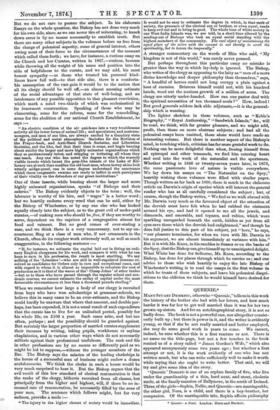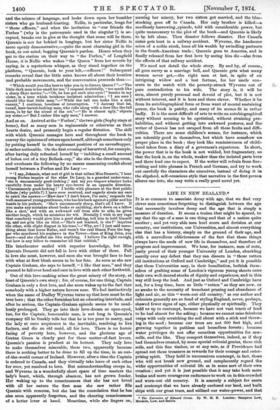WEENIE.*
MARY STUART DE MIMIC, otherwise " Queenie," tells us in this work the history of the bother she had with her lovers, and how much harder it WM for her to get well married than it was for her two grown-up sisters. And for an autobiographical story, it is not so badly done. The book is not a powerful one, nor altogether consist- ently built up ; but there is power in it, and the writer is evidently young, so that if she be not really married and better employed, she may do some good work in years to come. We cannot, indeed, be sure whether this is a first venture or not. There is no name on the title-page, but not a few touches in the book remind us of a story called "James Gordon's Wife," which also appeared anonymously some two years ago ; but whether a first attempt or not, it is the work evidently of one who has not written much, but who can write sufficiently well to make it worth while saying that she ought to write better. That said, we will try and give some idea of the story.
Queenie ' Demeric is one of an orphan family of five, who live under the guardianship of a thin, hard aunt, and stout, choleric uncle, at the family mansion of Ballymore, in the north of Ireland. Three of the girls—Sophia, Nellie, and Queenie—are marriageable, the Other girl, Nora, is a child, and there is a boy-brother, her companion. Of the marriageable trio, Sophia affects philosophy • Queente: a Nord. London: Hurst and Blackett. and the science of language, and looks down upon her humbler sisters who go husband-hunting. Nellie, in particular, longs for "those officers," and when the invitation to "our friends the Forbes" (why is the patronymic used in the singular?) is ac- cepted, breaks out in glee at the thought that some will be there. Queenie is not far behind- in longings, but her sister Nellie is more openly demonstrative,—quite the most charming girl in the book, to our mind, begging Queenie's pardon. Hence when they -get to the station on their way to "the Forbes," of Longfield House, it is Nellie who wakes "the Queen" from her reverie by Baying, in a mysterious whisper, as they stand together on the platform, "Queenie, look to your left,—officers !" Subsequent remarks reveal that the little minx knows all about their location and probable movements, and the conversation proceeds thus :— "Which would you like best to take you in to dinner, Queen ?"—" The little dark man is too small for me," I respond doubtfully, "too much like a sharp Skye terrier."—" Oh, he has got such nice eyes!" breaks in my sister, in a tone which betokens incipient admiration • "I am sure I should like that little man."—" While the tall one looks like a sick canary," I continue, heedless of interruption. "1 daresay that fat, round, beer-barrel-looking man, who rolls along with a face like the full moon is by far the nicest of the set."—" He is almost ugly," objects .my sister.—" But I rather like ugly men," I answer.
And so on. Arrived at the "Forbes'," the two girls (Sophy stays at ,home), find as many men in regimentals or otherwise as their hearts desire, and presently begin a regular flirtation. The skffi with which Queenie manages here and throughout the book to convey the opinions of others upon herself, although sometimes only by putting herself in the unpleasant position of an eavesdropper, is rather noticeable. On the first evening of her arrival, for example, after having duly refreshed herself by "imbibing a small amount • of bohea out of a tiny Belleek-cup," she sits in the drawing-roord, and overhears the following by no means unamusing confab about herself between a Forbes and De Lacy :-
"'I say, Johnnie, what sort of girl is that tallest Miss Demeric,' I hear young Forbes inquire of the elder De Lacy, in a guarded under-tone ; 'she is uncommonly good-looking ;' and my pro tempore admirer looks carefully from under his heavy eye-brows in an opposite direction. ' Uncommonly good-looking !' I bridle with pleasure at the first public tribute (why public?) I have ever received, and eagerly strain my ears to catch the answer.—'Haw-haw ! I don't know, Pm sure,' responds the -well-mannered young gentleman, who has his back against a pillar and his hands in his pockets. She's uncommonly sharp, that's all I know. If you make any mistakes about books or anything, she's down on a fellow like a shot,' and with an awkward roll from side to side, he gives another laugh, which he mistakes for wit. Mentally I wish in my rage that somebody would give him a good shaking, tell him to hold himself up, and not grin like an idiot.—' She's not learned, is she ? ' inquires the other, with slight disgust in his tone.'—' Why, awl I just said some- thing about that horse Rufus, and wasn't the real Simon Pure the beg- gar who murdered his nephews in the Tower—time of King John, you know—and she chaffed me like anything. I believe I'm right enough, tut how is any fellow to remember all that -rubbish."
-His interlocutor smiled with superior knowledge, but Miss Queenie Demmic did not fall in love with either of these. Fall in love she must, however, and soon she was brought face to face -with what at first blush seems to be her fate. As soon as she saw Captain Graham, she says to herself, "I like that man," and they proceed to fall over head and ears in love with each other forthwith.
Out of this love-making arises the great misery of the story, at least of Queenie's own story ; for, of course, for one thing, Captain Graham is only a first love, and she soon wakes up to the fact that somebody with a higher nature hovers near. We feel instinctively when the name of Dudley Wyverne turns up that here must be the true hero ; that the other furnishes but an educating interlude, and after he arrives, the Captain-Graham episode seems to be need- lessly prolonged. They go into their love-dream so open-eyed, too, for the Captain, honourable man, is not long in Queenie's Company till he frankly tells her that he is too poor to marry, and the lady at once acquiesces in the ;inevitable, resolving to live forlorn, and die an old maid, all for love. There is no heroic facing of poverty here, however, and the glorious age of Gretna Green is clearly past for these matter-of-fact lovers. Queenie's passion is prudent at its hottest. They only love to make themselves miserable, these two, apparently because there is nothing better to be done to fill up the time, in an out- of-the-world corner of Ireland. However, after a time the Captain is ordered to Canada, and they virtually take leave of each other for ever, yet resolved to love. But misunderstanding creeps in, and Wyverne in a wonderfully short space of time masters the lady's heart, which, through absence, has not grown fonder. Her waking-up to the consciousness that she has not loved with all her nature the first man she saw rather fills Queenie with remorse, but she has the consolation that he has also soon apparently forgotten, and the cheering consciousness of a better lover at hand. Meantime, while she lingers on,
nursing her misery, her two sisters get married, and the blue- stocking goes off to Canada. Her, only brother is killed—a. needlessly harrowing _episode, told with considerable power, but quite unnecessary to the plot of the book—and Queenie is likely to be left alone. Then disaster follows disaster. Her Canada sister gets hurt in a railway accident. Wyverne, the handsome scion of a noble stock, loses all his wealth by swindling partners in the South-American trade ; Queenie goes to America, and is finally released from her first love by seeing him die —also from,
the effects of that railway accident. •
We need not detail the whole story. By and by, of course, all goes merry as a marriage bell, and Queenie gets what many women never get,—the right man at last, in spite of an intriguing widow and a lost fortune, for her uncle con- sents to the match with the poverty-struck Wyverne out of pure contradiction to his wife. The story is, it will be seen, almost purely personal and devoid of plot, but it is not without interest, and it is here and there clever. Whether it be from its autobiographical form or from want of mental sustaining power, the book is patchy, and many of its scenes fit in rather badly. It is the most difficult of arts to write an autobiographical story without seeming to be egotistical, without straining pro- babilities, and without getting into awkward postures, and the writer of Queenie has not escaped from all these faults and diffi- culties. There are some children's scenes, for instance, which are tolerably good in themselves, but which have somehow no proper place in the book ; they look like reminiscences of child- hood taken from a diary of a governess's experience. In short, the power that is in the book is not welded, but fragmentary, so that the book is, on the whole, weaker than the isolated parts here and there lead one to expect. If the writer will refrain from fine- writing and trite phrases in French and German, and try to work out carefully the characters she conceives, instead of doing it in the slipshod, self-conscious style that narrative in the first person allures one into, she may write a really good novel yet.



































 Previous page
Previous page